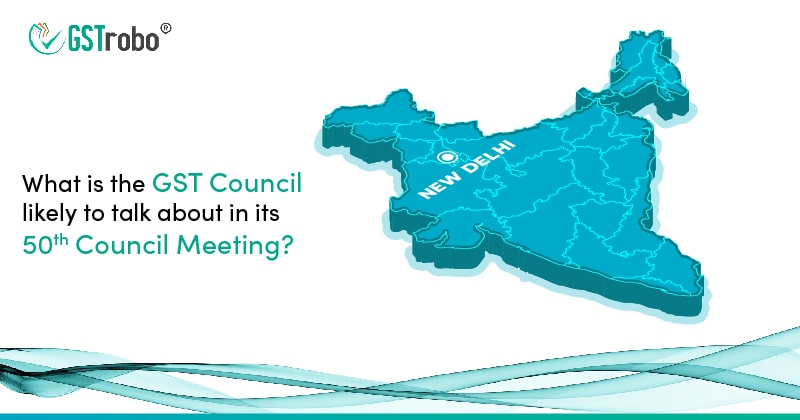50th GST Council Meeting – Expected agenda topics by FM Sitharaman
The 50th meeting of the Goods and Services Tax (GST) Council is scheduled to take place in July 2023, with Union Finance Minister Nirmala Sitharaman leading the proceedings. The primary focus of the meeting will be on taxation issues, according to available information.
Sources indicate that the council meeting will be held on July 11th, 2023. It is expected that significant progress will be made in establishing benches of GST appellate tribunals in various states.

Officials have a say that, at the moment, they don’t have any big plans to change the current GST rates and categories. However, they might adjust certain items if it helps ensure clarity. So, while major changes are off the table, they are open to reviewing and evaluating specific things necessary to ensure clarity in the GST system.
However, here are some expectations to be discussed in this council meeting.
GST Appellate Tribunals:
Addressing a long-standing demand from taxpayers, the establishment of Goods and Services Tax Appellate Tribunals (GSTATs) is expected to streamline and expedite indirect tax litigations, thereby reducing the burden on taxpayers and courts. Consequently, the forthcoming 50th GST Council meeting may discuss this matter.
Currently, taxpayers have to resort to lengthy and costly procedures such as filing appeals in high courts or making GST payments under protest. However, if GSTATs are established, they would serve as a secondary appellate forum and provide a common platform for dispute resolution between the central government and the states.
A group of industrialists has appealed to the central government to temporarily adopt a provision that allows pleas to be accepted by the assessee while paying only half the amount.
The Group of Ministers (GoM) report was accepted in the previous Council meeting with certain modifications. The final draft amendments to the GST laws will be circulated among Council Members for their input, and the Chairperson has been authorized to finalize them.
GST on Online Gaming, Casinos:
In the past year, the GST Council established a Group of Ministers (GoM) to deliberate on the taxation of online gaming, casinos, and horse racing. Currently, online gaming is subject to a new GST rate of 18% for skilled games without betting and 28% for games of chance involving betting and gambling.
While the GoM agreed on a 28% GST rate for all earnings from these activities, they have yet to reach a consensus on the base value for applying the tax rate. This lack of agreement led to the postponement of the discussion during the previous GST Council meeting held in February 2023. However, the upcoming GST Council meeting is anticipated to address and resolve the long-standing issue related to this matter.
Amendments in the E-invoicing timelines:
Recently, businesses were surprised when they were given a 7-day deadline to report their e-invoices on the Invoice Registration Portal (IRP). Even though e-invoicing has been around for over two years, there was no specific timeframe for generating these invoices.
This caused some problems because taxpayers used to gather their e-invoices for a week, a month, or even make them retroactively. To tackle this issue, the GST portal decided that the 7-day limit would only affect businesses with a turnover of Rs. 100 crore or more.
However, the GST portal later changed its decision and extended the deadline for reporting e-invoices by three months. We are still waiting for the department to announce the new date for implementing this rule. As a result, the Council is expected to discuss this topic in their next meeting and suggest changes to the GST law.
Automation on GST Return Scrutiny:
Recently, the Finance Minister, Smt. Nirmala Sitharaman told the department to check GST returns automatically and use technology to get more people to pay taxes. After having discussions with experienced officials, the Finance Minister requested the Central Board of Indirect Taxes and Customs (CBIC) to examine the existing cases and propose technological solutions to resolve them.
In addition, they talked about various topics, such as managing complaints, supporting employees, and finding ways to simplify processes for taxpayers. The aim was to find effective ways to address these issues and improve overall efficiency in the system. The department is expected to do something about these topics, and they might talk about them more in the next GST Council meeting, especially about checking returns and increasing the money collected.
Conclusion
A group of experts called the GST fitment panel is now responsible for deciding the different types of millet products and their corresponding tax rates. This panel includes representatives from the central government and various states who identify which products are made from millet and need special attention.
Additionally, the GST Council is expected to talk about fixing the inverted tax structure in the textile industry. This means they want to address the issue where the tax rate on some materials used in textiles is higher than the finished products themselves.
The meeting will cover various topics, including unresolved matters and changes to the GST procedures. In the previous 49th GST Council meeting held on February 18th, 2023, in New Delhi, an amnesty scheme was introduced to help people who filed their GST returns late, and the late fee was reduced as well.
